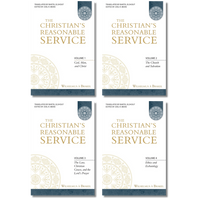
The Christian's Reasonable Service, Volume 2: The Church and Salvation (Brakel)
- Affordable shipping (free $100+)
- 100,000+ customers served
- "Wonderful books, great prices, awesome customer service." – Ivan, IL
Description
First published in 1700, The Christian’s Reasonable Service (De Redelijke Godsdienst) ran through twenty Dutch editions in the eighteenth century alone! The title is derived from Romans 12:1, “I beseech you therefore, brethren, by the mercies of God, that you present your bodies a living sacrifice, holy, acceptable unto God, which is your reasonable service.” It expresses what God requires from man, and particularly from the Christian, that he serve Him in Spirit and in truth—intelligently, rationally, and in harmony with and response to God’s revelation of Himself, His Word.
With a decidedly Puritan flavor and representing Reformed experiential religion at its best, Wilhelmus à Brakel systematically moves through the major doctrines of the Bible in hopes of seeing the minds of God’s people renewed for the purpose of promoting godliness. Throughout his work, but particularly in the practical application of each doctrine, à Brakel strives unceasingly to exalt the name of Jesus as the name that the Father has given above every other name—there being no other name given under heaven among men whereby we must be saved (Acts 4:12).
Table of Contents:
Ecclesiology: The Doctrine of the Church
24. The Church
25. The Duty to Join and Remain with the Church
26. The Communion of Believers with Christ and with Each Other
27. The Government of the Church, and Particularly the Commissioning of Ministers
28. The Offices of Minister, Elder, and Deacon
29. Ecclesiastical Authority and the Use of the Keys of the Kingdom of Heaven
Soteriology: The Doctrine of Salvation
30. The External and Internal Call
31. Regeneration
32. Faith
33. Distinguishing Marks of Saving Faith
34. Justification
35. The Adoption of Children
36. Spiritual Peace
37. Spiritual Joy
38. The Sealing of the Believer by the Holy Spirit and by Means of the Sacraments
39. Holy Baptism
40. The Lord’s Supper
41. The Practice of the Lord’s Supper Consisting in Preparation, Celebration and Reflection
42. The Life of Faith in Reference to the Promises
43. A Warning Exhortation Against Pietists, Quietists, and All Who in a Similar Manner Have Deviated to a Natural and Spiritless Religion Under the Guise of Spirituality
Endorsments
“Wilhelmus à Brakel’s The Christian's Reasonable Service is a tremendously insightful work that showcases the marriage between scholastic precision and a warm pastoral piety. À Brakel not only challenges the mind as he plumbs the depths of the teachings of Scripture, but he also challenges the heart as readers must grapple with the truth and its implications for their growth in grace. Not only can historians read à Brakel to learn about historic Reformed theology, but scholars, pastors, and laymen can all benefit from a close reading of these wonderful volumes.” — J. V. Fesko, Academic Dean and Associate Professor of Systematic Theology, Westminster Seminary California
“With its fine balance of Reformed doctrinal statement and application to Christian life and personal piety, à Brakel’s Christian’s Reasonable Service provides a superb illustration of the theological project associated with the late seventeenth century development of the Dutch Nadere Reformatie, or ‘Further Reformation.’ Although it abounds in sound definition and detailed exposition, this vernacular theology was intended not for the academic setting but for the purpose of educating the laity in both faith and practice. It remains a significant study in Reformed theology even as it exemplifies the true sense of the old Reformed maxim, Ecclesia reformata semper reformanda—namely, that the doctrine of the church has been reformed but the life of the Christian is always to be reformed, guided by the teachings of the Reformation. The Elshout translation beautifully conveys the sense and the spirit of à Brakel’s work.” — Richard A. Muller, P. J. Zondervan Professor of Historical Theology, Calvin Theological Seminary
“No systematic theology compares to Wilhelmus à Brakel’s The Christian’s Reasonable Service for its explicit concern to weld the objective and subjective in theology. Emerging from the Dutch Further Reformation, à Brakel is without equal in exploring both the intricate details of the Reformed theological system whilst ensuring that at every turn theology is done in the interests of piety and the glory of God. In an era when the subjective has either been lost in a sea of postmodernity or viewed with suspicion for its apparent lack of academic integrity, only those who have never read this monumental treatise would dismiss it as guilty of either. An achievement to place alongside Calvin’s Institutes and the systematic theologies of Turretin, Hodge, and Berkhof.” — Derek W. H. Thomas, John E. Richards Professor of Theology, Reformed Theological Seminary.
Author
Wilhelmus à Brakel was born on January 2, 1635 in Leeuwarden, the Netherlands. He studied theology at the universities in Franeker and Utrecht and was particularly influenced by his mentor, Gisbertus Voetius. He served four congregations in his native province of Friesland: Exmorra (1662–1665), Stavoren (1665–1670), Harlingen (1670–1673), and his birthplace, Friesland’s capital, Leeuwarden (1673–1683). His Friesland period, however, proved to be a preparation for the great task the Lord had laid away for him in Rotterdam—his final and longest pastorate (1683–1711). After a fruitful ministry of forty-nine years, it pleased the Lord to take this eminent divine—affectionately referred to by the godly as “Father Brakel”—home to Himself in 1711 at the age of seventy-six, to receive the reward of a faithful servant.









